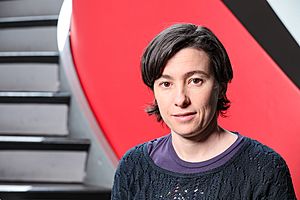Carmela Troncoso facts for kids
Quick facts for kids
Carmela Troncoso
|
|
|---|---|

Carmela Troncoso in 2020
|
|
| Born | 1982 (age 43–44) Vigo
|
| Citizenship | Spain |
| Alma mater | University of Vigo KU Leuven |
| Known for | DP-3T protocol |
| Board member of | Swiss National COVID-19 Science Task Force |
| Spouse(s) | Rebekah Overdorf |
| Awards | Google Security and Privacy Research Award Fortune's 40und40 ERCIM WG STM Best Ph.D. Thesis Award (2011) CNIL-INRIA Privacy Protection Award 2017 |
| Scientific career | |
| Institutions | École Polytechnique Fédérale de Lausanne (EPFL) |
Carmela González Troncoso (born in 1982 in Vigo, Spain) is a Spanish telecommunication engineer and researcher. She specializes in keeping digital information private and secure.
Currently, she is a professor at École Polytechnique Fédérale de Lausanne (EPFL) in Switzerland. She also works as a scientific director at the Max Planck Institute for Security and Privacy. She leads the SPRING lab, which focuses on Security and Privacy Engineering.
Carmela Troncoso became well-known for leading a European team. This team developed the DP-3T protocol. This protocol helped create an app to track people with COVID-19. The goal was to do this without sharing private information. She is also part of the Swiss National COVID-19 Science Task Force. This group advises on digital health during the pandemic. In 2020, Fortune magazine named her one of their "40 Under 40" influential people.
Contents
Carmela Troncoso's Journey in Tech
Carmela Troncoso studied engineering at the University of Vigo. She earned her degree in telecommunication engineering in 2006. After that, she went to KU Leuven in Belgium. There, she worked on her PhD degree. Her research focused on how to design and analyze privacy technologies.
Early Career and Research
After getting her PhD, she continued her research at KU Leuven. Later, she joined Gradiant. This is a research center in Spain. She worked there as a leader in security and privacy technology. In 2015, Troncoso became a faculty member at the IMDEA Software Institute in Spain. Since November 2017, she has been a professor at EPFL in Switzerland. She leads the SPRING lab, which is part of the School of Computer and Communication Sciences.
What Carmela Troncoso Researches
Carmela Troncoso's research helps create computer systems that are good for society. She focuses on three main areas:
- Machine Learning: She studies how machine learning affects our daily lives. This includes both the good and bad parts. She uses machine learning to build tools that make systems better. She also finds ways to protect privacy from attacks that use machine learning.
- Privacy Evaluation: Her lab helps people understand how much information they share online. They also help software developers create apps that protect user privacy.
- Building Private Systems: Troncoso works on creating guidelines for engineers. These guidelines help them build systems that keep information private. She also develops ways to check if these privacy-protecting technologies work well.
Based on her research, she helped create a tool called Datashare. This is an open-source tool for analyzing data together. She developed it with the International Consortium of Investigative Journalists (ICIJ). Datashare was used to analyze information in the Luanda Leaks case.
Her Role in the COVID-19 Pandemic
In 2020, during the COVID-19 pandemic, Carmela Troncoso led a big team. More than 30 people from eleven European groups worked together. They developed the DP-3T protocol. This was part of the Pan-European Privacy-Preserving Proximity Tracing (PEPP-PT) effort.
Developing Privacy-Focused Contact Tracing
Their goal was to create a computer app for contact tracing. This app would let people know if they had been near someone who later tested positive for the virus. The key was to do this while protecting people's privacy. Carmela Troncoso was the main author of the paper explaining the DP-3T protocol. Even Google said they were inspired by the DP-3T protocol.
Her work on the DP-3T protocol and the SwissCovid app was featured in many news stories. She also spoke at events like the IMPACT2020 conference. She also contributed to the International Committee of the Red Cross's guide on data protection for humanitarian work.
Awards and Recognitions
In September 2020, Carmela Troncoso was named one of the "40 influential people" under 40. This recognition came from Fortune magazine in the technology category.
Since 2020, she has been a member of the Swiss National COVID-19 Science Task Force. This group advises the Swiss Federal Council and the cantons on scientific matters related to the pandemic. She is part of the expert group focusing on Digital Epidemiology.
She has received several awards for her work. These include the ERCIM WG STM Best Ph.D. Thesis Award in 2011. She also won the CNIL-INRIA Privacy Protection Award in 2017 for her paper "Engineering privacy by design reloaded." In 2019, she received the Google Security and Privacy Research Award.
Selected Works
- Gürses, S., Troncoso, C. and Diaz, C., 2011. Engineering privacy by design. Computers, Privacy & Data Protection, 14(3), p. 25. PDF.
- Balasch, J., Rial, A., Troncoso, C., Preneel, B., Verbauwhede, I. and Geuens, C., 2010, August. PrETP: Privacy-Preserving Electronic Toll Pricing. In USENIX security symposium (Vol. 10, pp. 63–78). PDF.
- Pyrgelis, A., Troncoso, C. and De Cristofaro, E., 2017. Knock knock, who's there? Membership inference on aggregate location data. arXiv preprint arXiv:1708.06145.
- Mittal, P., Olumofin, F.G., Troncoso, C., Borisov, N. and Goldberg, I., 2011, August. PIR-Tor: Scalable Anonymous Communication Using Private Information Retrieval. In USENIX Security Symposium (p. 31). PDF.
See also
 In Spanish: Carmela Troncoso para niños
In Spanish: Carmela Troncoso para niños
 | Frances Mary Albrier |
 | Whitney Young |
 | Muhammad Ali |

